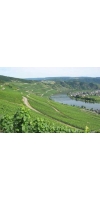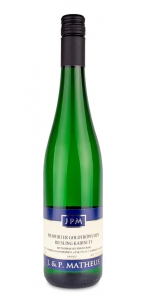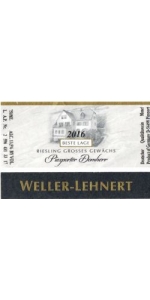Wine from Weingut Matheus

The Weingut Matheus Estate
Weingut Matheus is located in Piesport on the Mosel and has a 400 year tradition of winemaking (8 generations). Since 1992, the estate has been managed by Petra Hain-Matheus and Jorg Matheus, a graduate of the school in Geisenheim. Total estate production is 35,000 bottles or 2,916 cases annually, but they could produce more (50,000 bottles).
The Weingut Matheus Vineyard
Currently, they make wine from 13.6 acres of vineyards located in such sites as:
- Piesporter Goldtröpfchen (4.5 acres)
- Piesporter Treppchen
- Dhroner Hofberger
- Wintricher Ohligsberg
Matheus Piesporter Goldtropfchen Riesling Kabinett is made from 100 percent Riesling.
This Goldtröpfchen ranks as an unofficial "Grand Cru" delivering light floral and fresh Kabinett style wines.
Their later harvest wines, Spatlese and Auslese, tend toward apricot flavors, honeyed notes and superb intensity. All grapes are grown on Devonian slate.
Enjoy with slightly spiced sushi or moderately spicy Indian cuisine such as chicken Vindaloo.
Matheus Piesporter Michelsberg Riesling is made from 100 percent Riesling.
QBA stands for "Qualitätswein bestimmter Anbaugebiete", which means that the wine comes from one of the 13 designated wine regions.
A beautiful wine with delicate perfumed aromas. Medium bodied, well balanced, filled with peaches and green apples, crisp and fresh acidity.
Weller-Lehnert Piesporter Domherr Grosses Gewachs Riesling is made from 100 percent Riesling.
Made in accordance with the stringent production criteria of the classification of the Bernkasteler Ring, wines with the designation “Grosses Gewächs Bernkasteler Ring” represent the premium line of the association’s dry wines. These Grand Crus can only come from the best sites of the steep slopes and are distinguished by their exceptional aging potential. To be awarded the status of “Grosses Gewächs”, selective hand-harvesting, a restriction of yields to 50 hl/ha and the passing of a stringent sensory examination by a highly qualified professional panel are required.
Piesporter Domherr is the ancient and original Piesporter Goldtröpfchen. It lies in the heart of Piesporter Goldtröpfchen right by the Mosel River. It consists of 4 hectares that are south-southeast facing.
The locatio on the river creates a mirror effect, offering optimum conditions for the production of outstanding mineral wine with fine, fruity elegance. Because of its prolonged vegetation period, Riesling (frequently referred to as the “queen of white varieties”) is often capable of expressing the characteristics of its terroir like no other.
- back
Selected Options
Wineries
Categories
Pricing
Countries
Regions
Grape Types
Wineries
Organic/Free Shipping
Dark plum in color with abundant aromas of dark chocolate, black cherry, and sun-ripened blackberry with a hint of cedar. Layered flavors of blackberry and raspberry pie filling, accompanied by notes of cinnamon, chocolate, and nutmeg play on the palate. Smooth and focused with refined tannins and a medium finish.
Review:
-Wine Enthusiast 94 Points
-Tasting Panel 94 Points
Alexandre M Mon Chenin Cuvee 23 NV is made from 100% Chenin Blanc.
Mon Chenin means "My Chenin". This is Alexandre Monmousseau's personal view of what the Chenin blanc grape from France is - full of floral and fresh white fruits, a palate of yellow fruits and floral flavors, finishing clean, fresh, and dry.
Serve as Apéritif, seafood, fishes with buttery sauce, Asian cuisine, hard cheeses.







